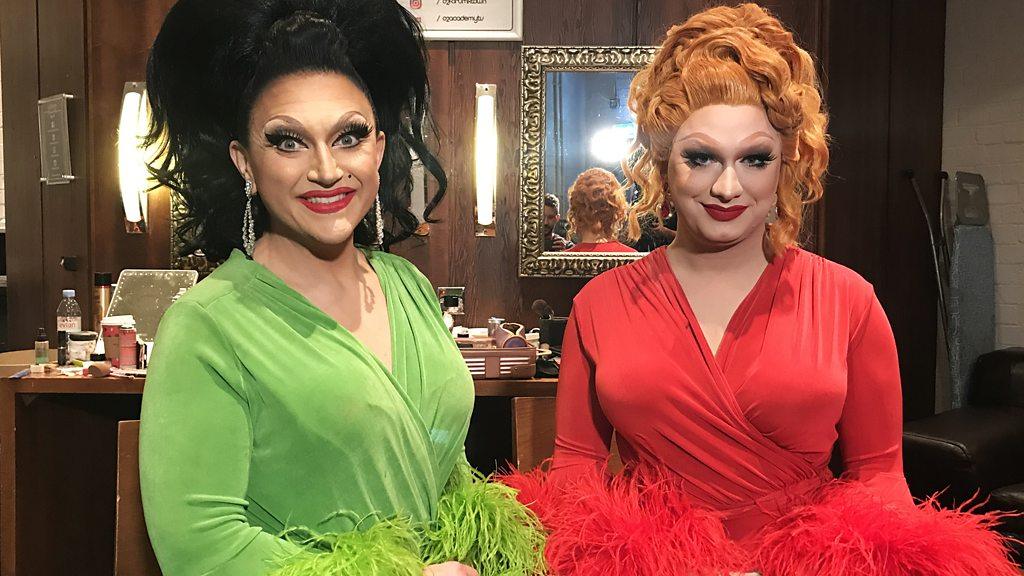RuPaul's Drag Race season 12: The most political, troubled series ever?
- Published
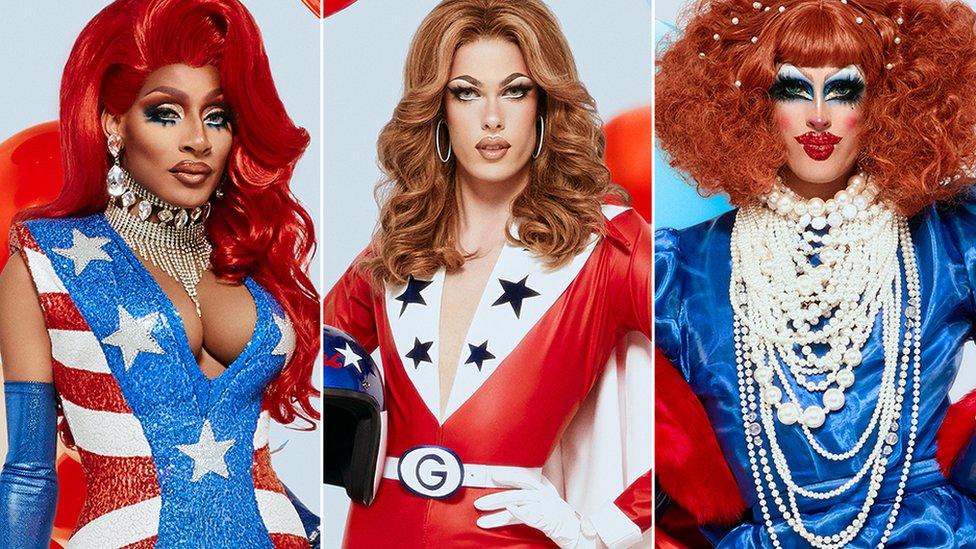
Jaida, Gigi and Crystal will compete in the season 12 finale
Strip the format of RuPaul's Drag Race back to its most basic and you might think it's a TV show about people competing to see who's the best at dancing around while pretending to sing a song.
But the 12th season has urged its US viewers to register to vote every week and made no secret of its political agenda.
This weekend, finalists Gigi Goode, Jaida Essence Hall and Crystal Methyd will compete (on a Zoom call) to be crowned the next drag superstar of the world.
Season 12 has been a bumpy ride for viewers though and negative press about the behaviour of contestants - as well as host RuPaul - threaten to overshadow its message.
In one episode, contestants Jackie Cox and Widow Von Du performed a lip-sync to Katy Perry's Firework - Jackie in a hijab based on the American flag, Widow in a gown inspired by the Black Panther Party.
When Democratic politician Alexandria Ocasio-Cortez appeared on the show as a guest judge, Jackie spoke about her Iranian mum's experiences in the US as an immigrant.
"People would tell her to go back to where she came from," explained a tearful Jackie.
"When I was young, I hid this part of my heritage for so long. She's an American citizen now. Seeing you standing up for people like my mum gives me so much hope."
Allow Instagram content?
This article contains content provided by Instagram. We ask for your permission before anything is loaded, as they may be using cookies and other technologies. You may want to read Meta’s Instagram cookie policy, external and privacy policy, external before accepting. To view this content choose ‘accept and continue’.

One episode included a challenge where contestants took part in a fake rally to become the first-ever drag President of the United States - a format that hasn't been seen on Drag Race since 2012.
And every episode has ended with contestants dancing on stage carrying signs reading "register to vote".
There's political bias on Drag Race, no doubt. It's a left-wing show with a strong anti-Trump message, one that's been ramped up ahead of the US election in November 2020.
Since coming to power in 2016, President Donald Trump has introduced, or tried to introduce, a number of measures which have stripped rights from LGBT people in America.
'Young people don't vote'
"Drag Race is a show that appeals to queer people, to women, to the groups that need to get out and vote," says Kevin O'Keefe, a US journalist who covers Drag Race for LGBT publication Xtra Magazine and considers himself a Drag Race "herstorian".
"It's mentioning politics more and more."
In the 2016 US election, only 50% of the population turned out to vote.
"Young people don't vote. That's a generalisation but the exit polls bear it out. A simple weekly reminder is useful," Kevin adds.
"Seeing those placards at the end of every episode, people may think it's showmanship, but that kind of repeated messaging actually does work."
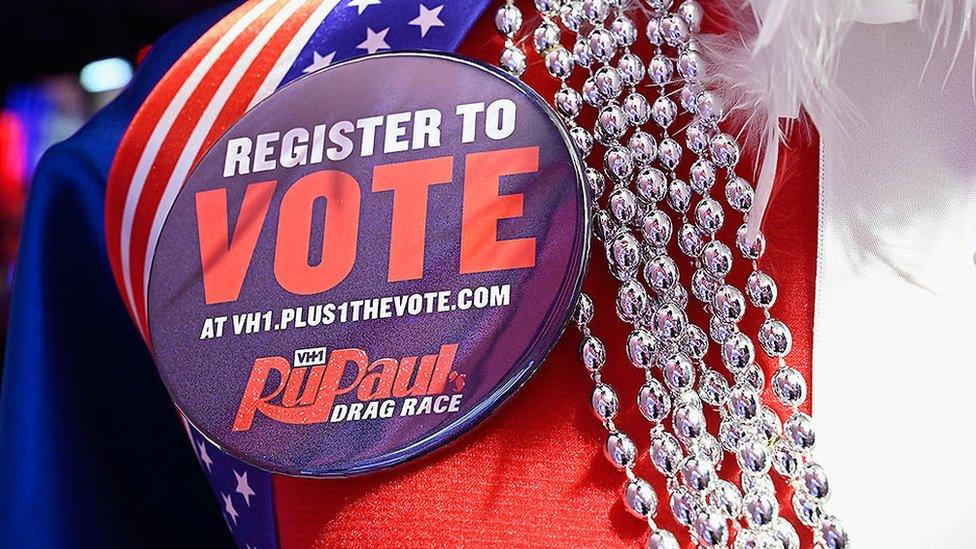
The "register to vote" message was part of the show's promotion before it hit screens
Season 12 isn't the first season where politics has played an obvious part.
Democrat Nancy Pelosi (the Speaker of the House of Representatives) made a brief appearance in the 2018 series of All Stars.
Contestants in 2016 had to produce smear campaigns against each other in season eight and in 2011 there were messages of support for US troops in season three.
But some Drag Race experts say the very nature of the show is political, even when it's not directly referencing what's going on in Washington.
"Drag Race has always shown that people come for the drag, but you stay because you fall in love with these queer people," says Mikelle Street, digital director of Out magazine.
"They always talk about issues that this community is dealing with."
In previous series', contestant Dusty Ray Bottoms spoke about their experience of conversion therapy, Nina West revealed they were threatened with murder by a far-right hate group while at college, Latrice Royale talked about spending time in prison.
"I don't know if season 12 is a return to politics, because I'm not sure the show ever left that," Mikelle adds.
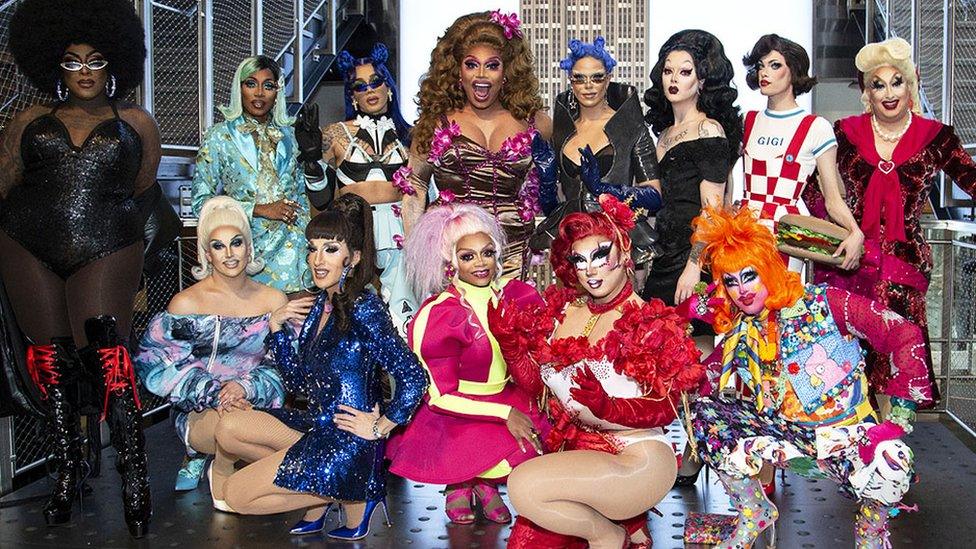
Mikelle says he believes there were fewer "filler" queens on season 12
Kevin says that just because politics has been mentioned more doesn't make it the most political season.
"There's part of me that just wants to say that season one was the most political because it presented drag in this very rough around the edges way, something the show has shied away from since," he says.
"To me, letting drag queens be their messiest selves and presenting Cameroonian drag in BeBe Zahara Benet and pageant drag in Shannel - that to me will always seem more political than holding up a 'register to vote' sign."
Where season 12 went wrong
Despite grand political ambitions for the 12th season of Drag Race, it's also been the most troubled.
A contestant was disqualified before the series started when sexual misconduct allegations were made against them, leading to a hasty re-edit of every episode to remove them from the show.
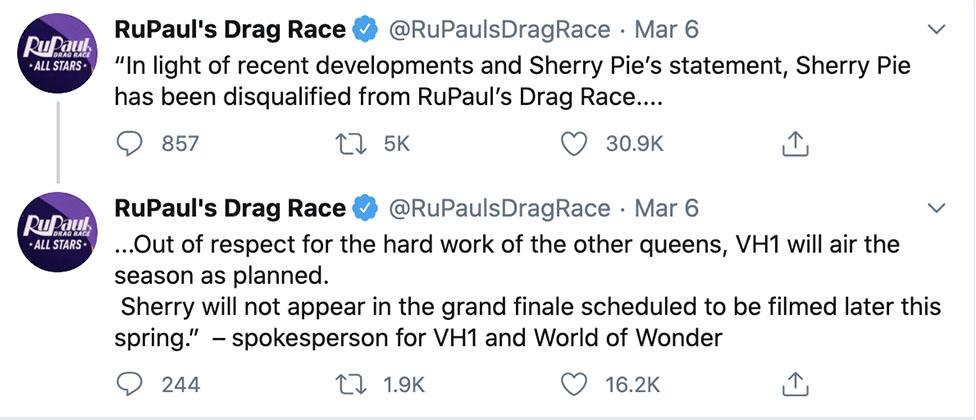
Producers of the show made the decision after the contestant apologised for their actions
Comments made by Jeff Goldblum about Islam's stance on homosexuality were widely criticised, external and even RuPaul faced their own controversy when it was revealed they lease part of their 60,000 acre Wyoming ranch to oil companies, external for fracking.
"The reality is that people like Ru were progressive when they were coming up," says Mikelle.
"But what happens with some of them - like Ru, like Ellen - is that they were progressive for their time when they were first coming in, and the movement continued to progress and they didn't necessarily move with it."
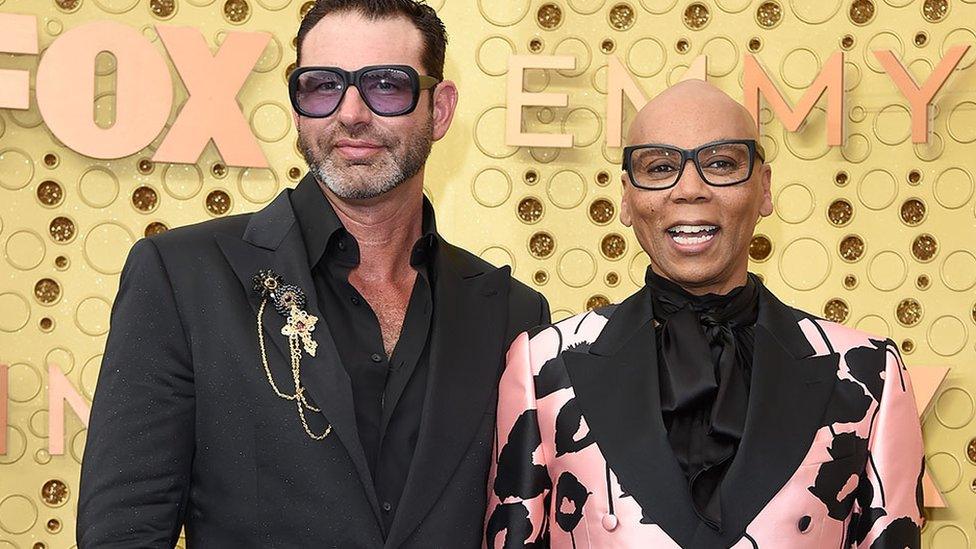
RuPaul faced backlash for leasing their land to frackers
But even if this is at odds with the left-wing stance the show has, the negative press didn't seem do any damage to viewing figures. Drag Race was the most-watched show for 18 to 34-year-olds, external in the US on Friday nights.
'A genuine weight on Jackie'
The show has also been affected by coronavirus, with its finale and reunion shows being filmed online due to social distancing measures.
Season 12's big political storyline ended just before the final when Jackie was eliminated in the last of the episodes filmed in 2019.
Kevin believes her time on the show will resonate with many LGBT viewers on a personal level.
"All of the stuff about her mum's experience as an immigrant, about her challenges with her former faith being Muslim, that all is a genuine weight on Jackie," he says.
"I think a small push opens the floodgates, a lot of queer people wear that stuff on their sleeve and it doesn't take much for that to come out."
Going into the final, both Kevin and Mikelle are backing the same contestant to win: Jaida Essence Hall.
"Jaida represents something we haven't seen since Tyra Sanchez won season two," says Kevin.
"She is a polished, gorgeous pageant girl. We've seen Asia O'Hara falter, we've seen Akeria Chanel Davenport falter - and I would be really bummed if it happened to Jaida."
But with the political agenda of season 12, RuPaul and the producers of Drag Race seem to want viewers to think about more than just who should become the world's next drag superstar when they watch the show.
"We're thinking about this administration, we're thinking about the election that's coming up," says Mikelle.
"Those are the things that we're all thinking about and the ways in which the policies or lack of policies from the administration are affecting our daily lives."


Follow Newsbeat on Instagram, external, Facebook, external, Twitter, external and YouTube, external.
Listen to Newsbeat live at 12:45 and 17:45 weekdays - or listen back here.
- Published7 March 2020
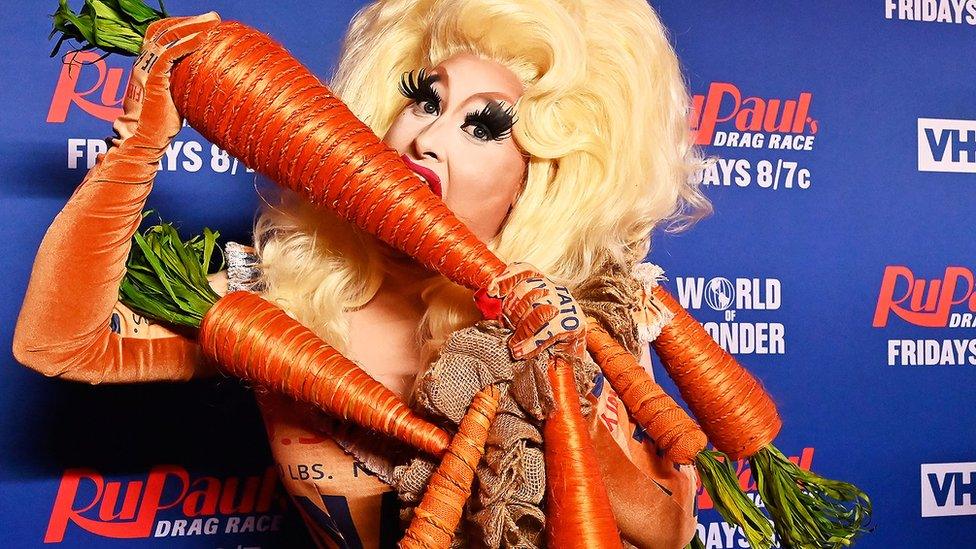
- Published6 September 2019
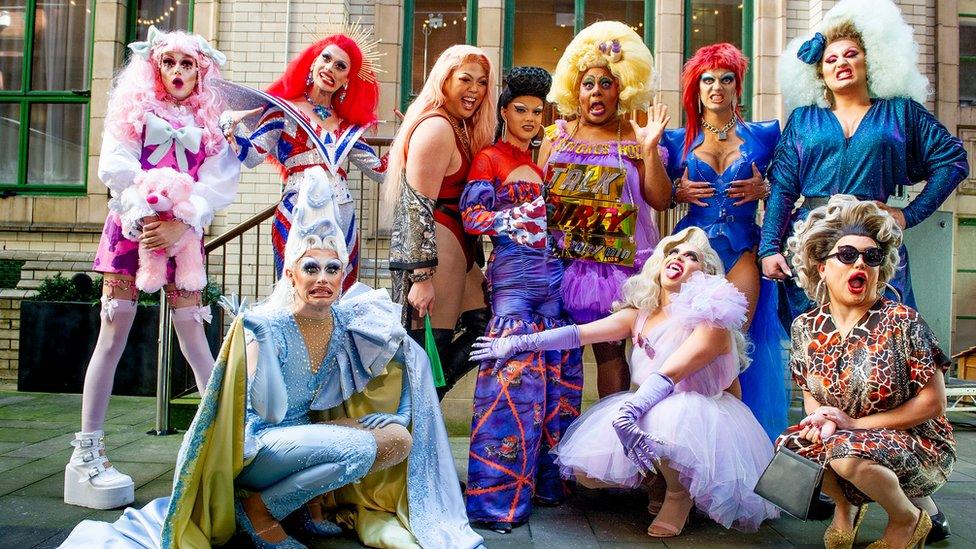
- Published31 December 2019
